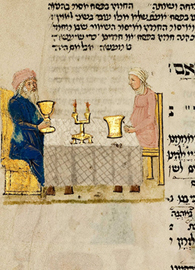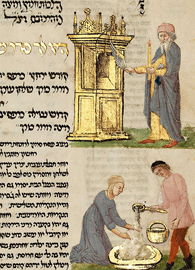Selections From Israel's Story Week 8
Be Holy, for God Is Holy: Leviticus 19
By Sara Koenig
Seattle Pacific University Associate Professor of Biblical Studies
Read this week’s Scripture: Leviticus 19
19:48

 Enlarge
Enlarge
Most people know Leviticus 19:18 but are not as familiar with the rest of the chapter. One reason we selected this chapter as part of “Israel’s Story” is that it is so important for understanding who Israel is — or, perhaps more accurately, who Israel is called to be. The different instructions come after the introductory commandment that sets the stage for what follows: Israel is to be holy, because God is holy (19:2).
We might be tempted to dismiss this as something impossible. How can sinful humans be holy? The last Lectio reiterated that Israel commits not only iniquities, but also sins and transgressions, and needs to be purified through specific actions of atonement. We summarized the book of Leviticus as affirming that God is holy and humans are not. How, then, do we understand the radical statement that starts this chapter?
In many ways, our view of this commandment must start with our view of God. Is God a stern dispenser of rules, one who would ask people to do something they cannot, and then punish them when they do not? Or is God a loving parent who wants the best for his children?
A positive understanding of God will help us understand God’s desire for humans to imitate and emulate God also as something positive. (This is the same issue that Dr. Nienhuis addresses in the Lectio “The Sermon on Discipleship,” where he explained that the very high standards for discipleship should be received as a gracious gift and a helping hand for those who want to want to live the most abundant life possible.)
As we see in the series of ethical commands in the rest of Leviticus 19, holy living is good not only for the one who practices it, but also for the rest of the community — a way for Israel to practically be a blessing to others (compare Genesis 12:3).
We might also need to reassess our understanding of holiness — a term that has been negatively associated with legalism and judgmentalism, referring to people who pride themselves on being “holier-than-thou.” In fact, though, holiness is a wonderfully positive concept, classically connected with being set apart, and linguistically related to being whole.
Holy living, as it is laid out in Leviticus 19:3–37, is not some lofty theory, but is made concrete when people treat one another with integrity, honesty, and justice. Even if we think that humans can never be fully holy, holiness is presented to us in this chapter as an inspiration and a goal.
Yet the way this chapter is structured and organized can be a challenge, as the sequence of commandments seems somewhat random. Leviticus 19:34, the call to “love the alien as yourself,” is referred to as the summit of biblical ethics. Jesus himself picked Leviticus 19:18, the command to love neighbor as self, as the second most important commandment (Matthew 22:39; Mark 12:31; Luke 10:27).
But these are embedded among commandments about animal husbandry, about cutting hair, and about leaving fruit on trees for a number of years. Instead of a strict linear progression of significance, the chapter offers us something like a treasure hunt, asking us to pay attention to the nuggets of gold that we find as we sift through all the specifics.
That is not to say, though, that there is no logic to how the commandments are presented. The refrain “I am the LORD your God” helps collect the different laws into groups. It also continually reminds us that these commandments are not isolated lists of dos and don’ts, but are always connected to God’s identity.

 EnlargeSpecifics for Holy Living
EnlargeSpecifics for Holy Living
The first set of commandments in 19:3–4 repeats the refrain “I am the LORD your God” twice. Also repeated are some of the commandments from Exodus 20: honor your father and mother, keep the Sabbath, do not worship idols or make cast images.
Verses 5–8 are about offering sacrifices of well-being, which were introduced in Leviticus 3 and 7:11–18. These sacrifices were made not to atone for wrongs, but to fulfill vows — or out of a free, often spontaneous, sense of joy. Thus, holiness is connected to an awareness of well-being and to the performance of acts to thank God that all is well. In this light, holiness is connected to two things:
- being aware that things are well and
- doing something concrete to express thanks to God that things are going well.
Verses 9–10 give the first instructions about a concrete thing that can be done in order to love the poor and the alien: as the Israelites harvest their land and vineyard, they must not take everything for themselves. Instead, they are to leave things for the poor and alien to glean. Loving the other is about providing for her or his physical need to eat. It is about sharing what you have with the other. These instructions are punctuated by another refrain, “I am the LORD your God.”
Verses 11–12 return to the Ten Commandments as they prohibit stealing, lying and profaning the name of the LORD. In Verse 13, the Israelites are prohibited from defrauding their neighbor. Then the New Revised Standard Version repeats, “you shall not steal,” perhaps suggesting that this was a serious issue and temptation.
The Hebrew, however, is better expressed as “you shall not rob.” Most other English translations align more closely with the Hebrew. Defrauding or robbing gets further defined and expanded by the explanation that they must not keep for themselves the wages of the laborer until the morning. In other words, those who employ others must pay them on time so they can use the money as they need. This is another very practical ethical command.
Verse 14 connects treatment of those who are deaf and blind to fearing the LORD. That suggests that a proper understanding of God, a fear of God, will have tangible effects on the way people care for others. Specifically prohibited is “reviling,” or insulting, the deaf; and putting a stumbling block before someone who is blind. The moral of the latter may seem more obvious: do not do something that would hurt one who is blind.
But the concern for the deaf expresses the deeper point of this verse, and a deeper point about holiness. It does not matter that one who is deaf could not hear an insult. Insulting someone who is deaf is wrong because of what it says about the person who makes the insult.
Holiness is certainly about doing concrete actions to care for others, and not doing things that would harm them. But it goes beyond that — it is a way of acting that comes from a pure heart, of doing what is right and good because it is right and good, not only out of fear of being caught [see Author’s Note 1]. Holiness is holistic.
Verses 15–16 are about justice, directly connected to legal cases: “with justice you shall judge” (19:15). But justice is also connected with not slandering and not profiting by the blood of a neighbor in 19:16.
The Hebrew here is a bit unclear: to slander is also translated “to be a talebearer.” The idea here seems to be that words matter, as Exodus 20:16 affirmed. “You shall not profit by the blood of your neighbor” is more literally in Hebrew, “you shall not stand against the blood of your neighbor.” Blood is connected with life, so the concern here seems to be protecting and preserving the life of the neighbor.
Verse 17 makes it explicit that the feelings of the heart are part of holiness when it commands, “you shall not hate in your heart anyone of your kin.” To some, this may seem like an odd command; of course we do not hate our relatives, we love them! We hate our enemies, or those unrelated to us. But others of us know that conflict between family members can be some of the most bitter and hurtful we experience.
Again, this is not only about what we do with hatred, and the actions and words that so often come out of hatred — it is about hating in our hearts. The prohibition against hatred in 19:17 is followed by the positive command to reprove — or correct — your neighbor. Verse 18 also starts with a prohibition against taking vengeance or bearing a grudge, and then it is followed by the positive command to “love your neighbor as yourself” [see Author’s Note 2].
Verses 19–28 are introduced with another general command, “you shall keep my statutes.” Then specific statutes are given, starting in 19:19 with the prohibition against mixing animals, seeds (compare Deuteronomy 22:9), or materials.
One of the first actions of God in Genesis 1 was to separate: God separates the waters above the earth from the waters below the earth, the land from the water, etc. Because God separated, humans are not supposed to mix. This verse reminds us that the social world of the Israelites was different from the one in which we live: many of us think nothing of a cotton-polyester blend shirt.
That our world is different from theirs becomes even more apparent when we read 19:20–22, and we are confronted with the social and sexual politics in ancient Israel. It is important to acknowledge the difference, as well as to understand that not every Old Testament commandment is normative for today. Once we admit that, we may be able to see that 19:20–22 tells us that, even though the man who “has sexual relations with a woman who is a slave, designated for another man but not ransomed or given her freedom,” is not guilty before humans (for his was not an act of adultery, and the female slave does not have the full rights of a free person), he is still guilty before God.
This example shows us some of the complexity of the Old Testament laws. We may not like the social world they present. We ought not to apply their every detail to our contemporary lives — that is, 19:20–22 must not be read as permission for men to have sexual relations with slaves, especially when human trafficking continues to grow throughout the world. We see that these laws are given by God to the people, but, even when the previous laws would allow for a type of action, God still sees that action as sin.
From the gravity of sexual sin, the chapter turns to commandments about waiting to eat fruit from trees (19:23–25). These seem to be wise agricultural practices, as 19:25 indicates (“that their yield may be increased for you).” But by now we ought to recognize that holiness is not only wise and practical; it is also about trusting God. In this example, it is about trusting that the trees will yield their fruit. It is about obeying the commands that God has given because God has given them.
In the fourth year, the fruit is to be set apart for rejoicing in the LORD (19:24). Many of the current Jewish dietary practices are about mindfulness of what is eaten and how it is prepared. While we may be able to eat a piece of fruit in a matter of minutes, perhaps we would do well to be mindful about the time it takes a tree to bear fruit, and the providence of God who created every tree with seed in its fruit (Genesis 1:29) [see Author’s Note 3].
Verse 26 continues the theme of what can and cannot be eaten by prohibiting eating anything with its blood. Again, blood was connected with life, but this also gets instantiated with kosher butchering practices, which seek to kill animals for food in the quickest and most humane manner possible [see Author’s Note 4]. Verse 26 also prohibits the practice of augury (divination) or witchcraft. Verse 27 is about cutting “the hair on your temples” and “the edges of your beard.” Verse 28 is one that has been understood as an overall prohibition against tattoos.
However, when we look at it in context, we notice its connection with the commandment, “You shall not make any gashes in your flesh for the dead ….” Cutting one’s flesh and getting a tattoo were pagan mourning practices of the time, and Israel was not to participate in such rituals.
Verse 29 is another strange one, reminding us again of the different social world, one in which the way a parent treats a daughter has ramifications for the land. Verse 30 is another positive command to keep God’s Sabbaths and reverence God’s sanctuary (or holy place). Verse 31 warns against turning to, or seeking out, mediums or wizards. Here we have an explanation: doing so would defile Israel. Verse 32, like Verse 14, connects treatment of others — specifically, respecting the elderly — with fearing God.
Verses 33–34 are about the way Israel is supposed to treat the alien or the foreigner: “you shall love the alien as yourself.” While we rightfully understand the call to love your neighbor as yourself to be profoundly important, we must not miss the increasing profundity of this command: That is, God’s command to love does not stop with a neighbor — one who is in close proximity and might even be related to you — but extends it to the one who is different, who is other. These are ethical practices that many assume were original to Jesus, forgetting that Jesus was a faithful Jew. Here, too, we have another explanation for the commandment: “for you were aliens in the land of Egypt” (19:34).
The chapter concludes in 19:35–36 with commands to use honest weights and measurements — aspects of holy living that may not seem quite as sublime as the command to love the foreigner as yourself, but still significant marks of a life of integrity. Verse 36 ends with the refrain, “I am the LORD your God, who brought you out of the land of Egypt.” Of course, that is the same phrase that begins the Ten Commandments (Exodus 20:1). Israel’s memory of who God is, and what God has done for them, is what motivates them to act with love to others.
We also must note how nowhere in Leviticus 19 does it say that keeping these commandments is a precursor for a relationship with God. A relationship with God is a given, reiterated by the personal possessive in the refrain, “I am the LORD your God.” God is their God, who desires that they live in such a way that the relationship can be seen by others.
In the letter to the Galatians, Paul writes about freedom from the law. However, Paul also quotes Leviticus 19:18, in Galatians 5:14, as the single commandment that summarizes the whole law! Later in the chapter, Paul connects freedom from the law with being led by the Spirit (Galatians 5:18), who can guide people into living a holy life.
We see that the holiness described in Leviticus 19, and the holiness that bears fruit of love, joy, peace, patience, kindness, generosity, faithfulness, gentleness, and self-control (Galatians 5:22–23) is not mutually exclusive. Indeed, Leviticus 19 cannot make someone alive (Galatians 3:21). But following the commandments in Leviticus 19 can transform a life, as the laws listed there can — even today — be markers for holy living.
Questions for Further Reflection:
- Chapter 19 starts off with the hefty statement, “Be holy because I, the LORD your God, am holy.” What emotions or thoughts does this statement evoke for you? What does the Lectio writer assert about holiness that might reframe the concept?
- The Lectio writer notes that these laws are set in a different time, culture, and social context than the world in which we live. How are we to discern which laws are universally applicable, and which are culturally specific?
- The Lectio writer also notes thematic and practical ways we can apply the spirit of these laws today. What were some of the applications that stood out to you, and why?
- Twice in this chapter, God’s people are commanded to love others (their neighbors, the alien). How is love a commandment? What does it say about God and God’s people that this command is repeated so frequently?

This work is licensed under a Creative Commons License.




